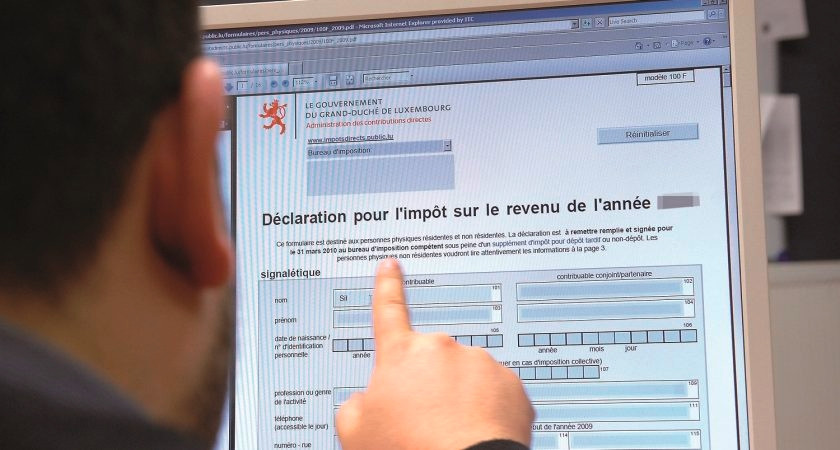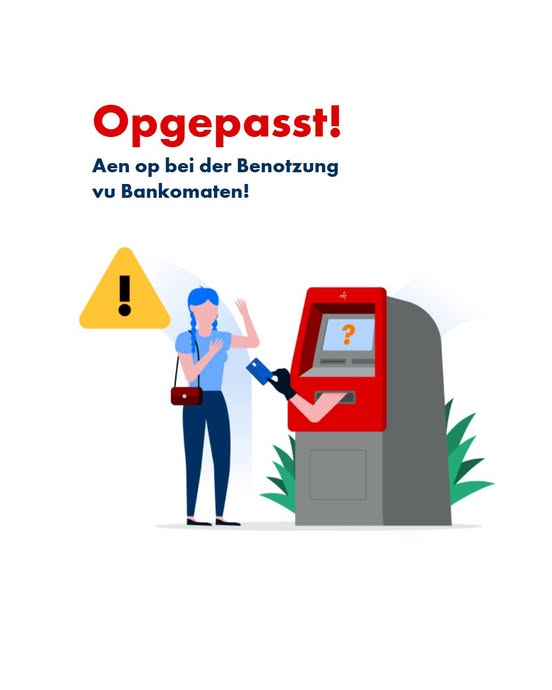Luxembourg Launches Tax Filing Season with New Pre-Filled Option for Select Households ...
Luxembourg Authorities Warn of Sophisticated Bank Card and PIN Theft Techniques ...
From Wolf Sighting in Northern Luxembourg to a New Case of Rabbit Fever in the South ...
Luxembourg’s Democratic Party Moves Toward an All-Female Leadership ...
Luxembourg Launches Tax Filing Season with New Pre-Filled Option for Select Households

Luxembourg – April 21, 2025
As the 2024 tax filing season officially begins in Luxembourg, the first wave of diligent and proactive taxpayers has already submitted their returns via the MyGuichet platform or using traditional paper forms. This year, however, marks the introduction of a new simplified and pre-filled tax return system, aimed at easing the process for a specific group of residents.
The official tax declaration forms, along with the MyGuichet.lu electronic assistant, became available as of Monday. Thousands of individuals have since received formal invitations from the Administration des Contributions Directes to complete their annual declarations. In fact, a significant number of taxpayers were contacted earlier this year.
New Option for 20,000 Households
Between March 3 and March 28, 2024, the tax administration offered around 20,000 households the opportunity to use the new pre-filled and simplified tax return system (déclaration préremplie et simplifiée). This innovation is designed for individuals whose income comes solely from wages or pensions, with no additional revenue from sources such as property, shares, or specific deductible expenses.
In this new system, data from the previous year is automatically pre-filled in the form. Taxpayers are only required to review the information and confirm its accuracy by signing. For those seeking to minimize the time spent on filing, this system offers a significant time-saving benefit.
Individuals who did not opt into the pre-filled system, or were not eligible, can still file their returns using the standard PDF form, the paper version, or the digital assistant on MyGuichet.
Deadline and Risk of Late Penalty
As in previous years, taxpayers have until December 31, 2024, to submit their tax returns. Failure to file by the deadline may result in a 10% penalty. Tax experts continue to recommend early submission to ensure faster processing and quicker resolution of any refunds or additional payments due.
Noticeable Drop in Backlogged Cases
The tax administration also reported substantial progress in clearing backlogged tax files. While the backlog stood at over 25,000 cases in June 2022, the number had dropped to just 200 cases by the end of August 2024—an impressive improvement that reflects enhanced efficiency within the tax system.
These developments underscore the government’s commitment to modernizing tax procedures and making the process more accessible for citizens. At the same time, the effectiveness of these reforms depends on the continued awareness, engagement, and cooperation of taxpayers in navigating Luxembourg’s evolving fiscal landscape.
Luxembourg Authorities Warn of Sophisticated Bank Card and PIN Theft Techniques

Luxembourg – April 21, 2025
While withdrawing cash from ATMs may seem like a routine and risk-free task for most people, authorities in Luxembourg are warning of increasingly sophisticated and often invisible methods used by criminals to steal bank cards and PIN codes.
The State Bank of Luxembourg (Spuerkeess - BCEE) and the Grand Ducal Police have issued public warnings alerting users to new forms of ATM-related fraud recently identified in the country. These include card trapping, skimming, and the use of fake keypads, all carried out with such precision that victims are often unaware that a crime has occurred.
Card Trapping: The Hidden Theft
One of the most common tactics is known as card trapping. In this method, fraudsters install a mechanical device inside the card slot, which causes the card to become stuck inside the ATM after a transaction. Believing it to be a technical fault, the victim walks away, unaware that the criminal will return shortly after to retrieve the card and use it illegally.
Skimming: Stealing Card Data Invisibly
Another technique, known as skimming, involves placing a small, discreet device over the ATM’s card reader. This gadget copies data from the magnetic strip of the card as it is inserted. These data can later be used to create a cloned card. However, the card’s data alone is not sufficient to access funds—the criminal still needs the cardholder’s PIN.
Capturing the PIN: Hidden Cameras and Fake Keypads
To obtain the PIN, fraudsters employ ingenious methods. One involves placing tiny, hidden cameras near or above the keypad to record the PIN as it is being entered. These cameras are often concealed within the ATM’s plastic casing and are extremely difficult to detect.
Alternatively, some fraudsters install a fake keypad directly over the original one. When the victim enters their PIN, the fake keypad records it without raising any suspicion, while the ATM appears to function normally.
How to Protect Yourself
Bank security experts recommend covering the keypad with your other hand while entering your PIN to prevent it from being seen by hidden cameras.
Before using any ATM, always inspect the card slot and keypad for any unusual attachments or signs of tampering.
If your card becomes stuck in the machine, do not leave the area. Contact your bank immediately. It’s also strongly advised to regularly monitor your bank account for any unauthorized transactions.
Finally, if you notice anything unusual or feel unsafe near an ATM, report the incident to the police immediately. Public awareness remains one of the most powerful tools in preventing these covert forms of financial crime.
From Wolf Sighting in Northern Luxembourg to a New Case of Rabbit Fever in the South

Luxembourg – April 21, 2025
In two separate official statements, Luxembourg authorities have reported two significant environmental events in the country. The first involves the confirmed sighting of a wolf in the Kiischpelt–Clervaux region in the north. The second relates to a new case of tularemia (commonly known as rabbit fever) detected near the village of Wellenstein in the south.
Wolf Confirmed in Northern Luxembourg
On Tuesday, the Administration for Nature and Forests (Administration de la nature et des forêts) announced that a wolf had been seen and photographed last Friday in two different locations within the Clervaux area. After a thorough analysis of the images, experts officially confirmed that the animal captured in the photographs is indeed a wolf.
However, officials emphasized that it remains unclear whether the wolf is still present in Luxembourg or merely passing through. Citizens are encouraged to report any further sightings or signs of the animal's presence by emailing wolf@anf.etat.lu without delay.
Since 2017, solitary wolves have been regularly observed across different parts of the country. In neighboring countries such as Belgium and the Netherlands, wolf packs have reestablished themselves in various ecosystems over the past few years.
The administration also noted that direct contact between wolves and humans is extremely rare, as wolves naturally avoid humans. Still, they may occasionally approach out of curiosity before retreating.
For those interested in learning more about wolf behavior and how to safely respond to potential encounters, a brochure titled "Wolves in Luxembourg" is available to the public.
New Case of Rabbit Fever Confirmed in the South
Meanwhile, on Wednesday, the Veterinary and Food Administration of Luxembourg (Administration vétérinaire et alimentaire – ALVA) issued a warning about a confirmed case of tularemia near Wellenstein, located in the southern Remich region. The infected rabbit carcass was found on Monday, April 14, 2025, and delivered to the Veterinary and Food Laboratory (LVA), where it tested positive for tularemia on April 16.
According to the Ministry of Agriculture, Food, and Viticulture, tularemia is a rare but highly contagious bacterial disease caused by Francisella tularensis. It poses a serious health risk not only to wildlife but also to humans.
Transmission can occur through:
Direct contact with infected animals or carcasses
Drinking contaminated water
Inhaling contaminated dust
Bites from infected ticks or blood-feeding insects
Health and Safety Recommendations
ALVA has issued the following precautions:
Avoid direct and unprotected contact with wild animals or their carcasses.
Always wear disposable gloves and an FFP2 or FFP3 mask when handling dead animals.
Cook rabbit meat and liver thoroughly, as heat reliably kills the bacteria.
Keep pets such as dogs and cats away from wild rabbits, as they can become infected and transmit the disease to humans.
Disinfect any tools or surfaces that may have come into contact with potentially infected animals.
If sick or injured wild animals are found, residents are advised to contact the Centre for Wildlife Rescue in Dudelange (Centre de soins pour la faune sauvage de Dudelange). Suspicious animal carcasses can also be submitted to the LVA laboratory for examination, following prior coordination. For assistance, call +352 24782544.
These simultaneous warnings highlight the growing importance of public awareness and cooperation in addressing both environmental and health-related risks in Luxembourg.
Luxembourg’s Democratic Party Moves Toward an All-Female Leadership

Luxembourg – April 21, 2025
In a notable and potentially historic shift in the leadership structure of Luxembourg’s Democratic Party (DP), the party officially announced new candidates for its top positions on Friday—paving the way for what could become its first all-female leadership team.
Among the most prominent names, Yuriko Backes, Luxembourg’s Minister of Defence and Mobility, has been nominated for the position of First Vice-President, currently held by Max Hahn, Minister for Family Affairs.
This development follows an earlier announcement made two weeks ago by Carole Hartmann, Member of Parliament and Mayor of Echternach, confirming her candidacy to succeed Lex Delles, the party’s current president and Minister of the Economy. In parallel, Eric Thill, Minister of Culture, has put his name forward to succeed Hartmann as the party’s Secretary General.
In a post shared on social media last Friday, Carole Hartmann revealed that two additional women have also entered the race for vice-presidential roles within the party: Corinne Cahen, a former DP president and minister, and Amela Skenderovic, a rising political figure who ran in the recent European elections. Should all four candidates be elected, the leadership of the Democratic Party would, for the first time in its history, be entirely female.
Claude Lamberty to Retain a Role
Another notable development is the continued involvement of Claude Lamberty, the current Deputy Party President. According to Hartmann, Lamberty is expected to remain active in the new executive committee in a newly conceived role as “experienced municipal affairs representative,” working alongside Eric Thill—although such a position does not currently exist within the party’s formal structure.
Annual Party Congress to Decide Leadership
The Democratic Party’s annual congress is scheduled for April 27, during which the final vote on leadership roles will take place. Current party president Lex Delles has already stated he will not seek re-election, citing time constraints due to his ministerial responsibilities.
A Potential Milestone for Gender Balance
Should the proposed candidates be elected, this shift would not only mark a leadership transformation within the DP but could also set a powerful precedent for gender balance in party leadership and broader political structures in Luxembourg. The move signals a growing commitment to diversity and inclusivity at the highest levels of decision-making within one of the country’s most prominent political parties.
